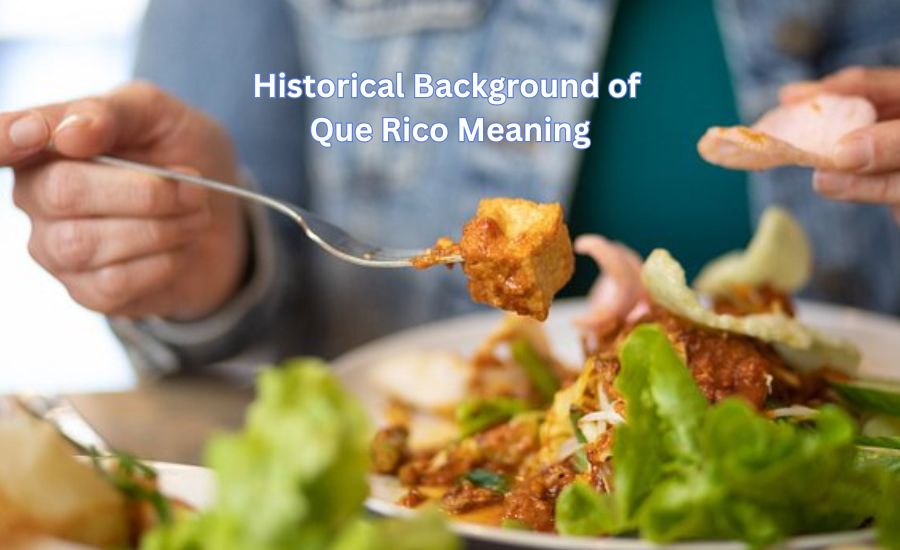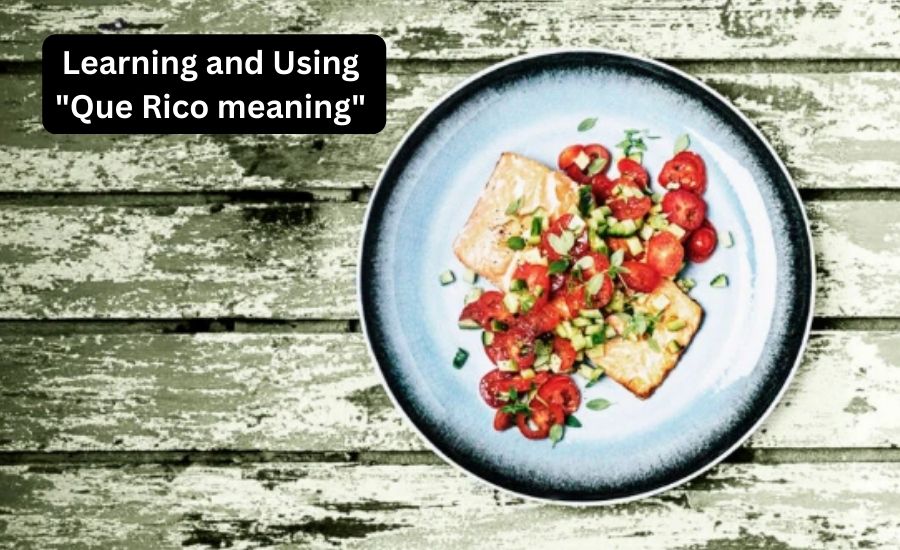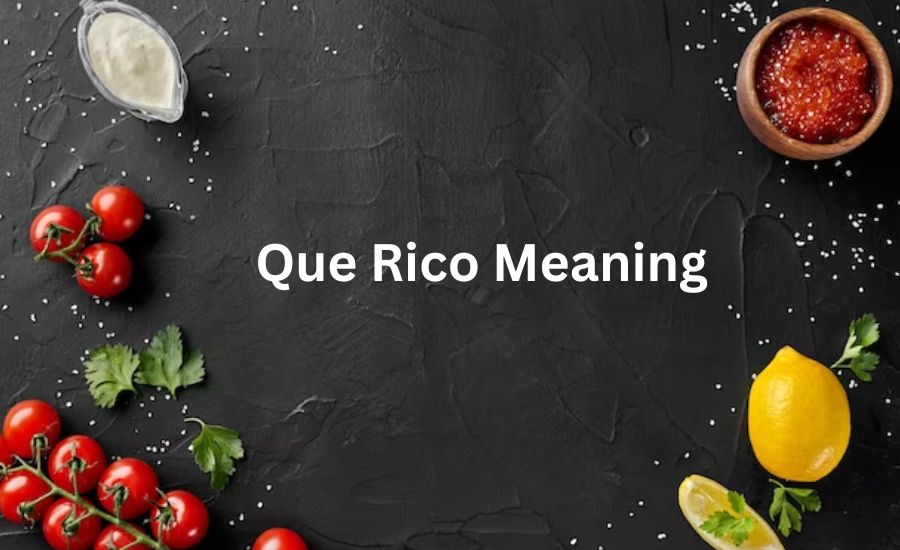“Que Rico meaning” is a versatile Spanish phrase expressing delight and pleasure that’s used when discussing food, experiences, or affection. We explore its historical roots, cultural significance and regional variations here as we cover its literal translation and contextual usage in everyday conversations and popular media; non-native speakers can find tips to incorporate “Que Rico” into their vocabulary while avoiding common errors, learning this phrase helps strengthen Spanish skills as well as deepen cultural appreciation – dive in now for this comprehensive guide that unveils all that “Que Rico” offers in 2024!
What is Que Rico Meaning
Its “Que Rico” translates from Spanish as “How rich or delicious”, in English it often expresses pleasure or delight when discussing food but can also be applied more broadly – for example, it could convey admiration and affection or enhance conversational interactions – all things we take pleasure from experiencing or convey. Understanding “Que Rico meaning” gives us a greater appreciation of Spanish-speaking cultures while enriching language skills with the emotional nuances of social conversations and dialogues.
Historical Background of Que Rico Meaning

Origins and Early Usage: “Que Rico” can be traced back to Spanish-speaking cultures, where it traditionally expressed pleasure and satisfaction with food-related delights. This is reminiscent of its use during Spanish colonization and culinary traditions prevalent throughout South and Latin American nations.
Over Time: Over the years, “Que Rico meaning” has seen more use beyond food descriptions than originally intended. While still commonly used to refer to delicious meals, “Que Rico” began being applied broadly as an expression to convey general pleasure and enjoyment—whether from beautiful experiences to affectionate remarks.
Cultural Integration: Over time, “Que Rico” became part of mainstream popular culture—music videos, television programs, and everyday conversation all used it to convey delight or appreciation from Spanish-speaking audiences alike. This widespread usage established it as an easily conveyed expression.
Literal Translation of “Que Rico meaning”
In English, “Que Rico” translates literally as either “How Rich” or “How Delectable.” While que signifies how Rico can mean either richness in flavour when discussing food items or something enjoyable that brings pleasure—thus emphasizing its versatility and capacity for conveying deep satisfaction and pleasure through language. This literal translation highlights its adaptability in communicating this rich feeling of fulfilment or pleasure that this Spanish phrase conveys.
“Que Rico meaning” in Everyday Conversations

In everyday conversations, “Que Rico” can be used as an expression of enjoyment or pleasure. For instance, after tasting an exquisite dish, they may exclaim, “Que Rico!” to demonstrate just how much they enjoyed its flavours. This phrase applies to other pleasurable experiences as well, like gazing upon an appealing landscape or enjoying a relaxing moment. “Que Rico” can also be used outside the realm of food to give praise for culinary efforts, highlight an enjoyable experience – or express affection in a warm yet casual way.
Non-native speakers should use “Que Rico” appropriately; using this informal expression of affection can enhance conversational skills while adding cultural authenticity into interactions; its wide applicability makes “Que Rico” an indispensable addition to daily Spanish dialogue!
Cultural Significance of Que Rico meaning
Cultural significance encompasses any meanings ascribed by its members for such elements as festivals, rituals and artefacts – for instance, as expressions of identity heritage and community – serving to express meanings such as meaning of identity heritage, community values, etc. Understanding cultural significance helps appreciate cultural diversity while increasing appreciation among different backgrounds, with mutual respect being fostered across differences; furthermore, it helps ensure the preservation of cultural heritage for future generations!
Common Contexts
Common contexts refer to situations or settings where certain events, interactions, or behaviours tend to happen and provide a framework for understanding actions and communications. Educational environments, for instance, offer learning activities, while social ones foster relationships and conversations among participants. Recognizing common contexts allows us to anticipate situations effectively and respond accordingly for maximum communication and interaction effectiveness.
Regional Variations
Geographic variations refer to differences in language, culture, traditions and practices that exist across geographic areas. Such differences include dialects, cuisine, customs and even social norms that occur from place to place. English itself features several regional varieties, like British English, American English and Australian English, each with its own vocabulary and pronunciation. Understanding regional variations is integral in appreciating cultural diversity while simultaneously creating effective interactions across regions.
Learning and Using “Que Rico meaning”

“Que Rico meaning” is a Spanish phrase often used to express enjoyment or delight when discussing food, translating to “How delicious!” in English. This expression of pleasure has become ubiquitous across Spanish-speaking cultures to express appreciation of a meal’s flavour or quality; learning its use requires understanding its context and appropriate scenarios – such as when someone serves you an enjoyable dish when saying, “Que rico!” to show appreciation or describe a pleasant aroma or atmosphere.
Emotional and Social Impact
Emotional and Social Impact Refers to the effects that events, interactions or experiences have on an individual’s emotions and social relationships. Emotionally, this could include changes in mood or stress levels. At the same time, socially, it would impact how individuals form connections within communities – whether positive impacts include increased happiness, stronger bonds or a sense of belonging versus negative ones such as isolation, anxiety, conflict, etc. Understanding emotional and social impact is vitally important when creating supportive environments in families, workplaces, or communities which promote mental well-being while cultivating positive interactions among members as it facilitates community-building efforts as well as creating supportive environments within families working environments within families workplaces/communities/ communities/environments etc.
Modern Adaptations of Que Rico meaning
Modern adaptations refer to contemporary versions or reinterpretations of traditional stories, practices or objects which have been updated to conform with contemporary tastes, technologies and social contexts. Such adaptations are found across literary, film and fashion industries as well as cultural practices; classic novels may be updated into movies set during contemporary times, while traditional recipes could incorporate fresh ingredients or cooking methods for increased relevance to today’s audiences. Modern adaptations serve to bridge the past and present by keeping timeless themes accessible while at the same time reflecting society’s ever-evolved values while keeping cultural heritage vibrantly relevant today!
Conclusion
Overall, human culture exemplifies its dynamic and multidimensional qualities through various aspects such as cultural significance, common contexts, regional variations and modern adaptations. Acknowledging cultural significance allows us to appreciate and preserve its rich traditions, recognize common contexts for effective communication and interaction, as well as promote regional differences for further respecting cultural diversity. Modern adaptations connect past to present, keeping traditional stories, practices, and objects relevant in today’s society. Together, these elements contribute to a deeper understanding of human experience, encouraging empathy, connection, and mutual respect across different cultures and communities. As we navigate an ever more interdependent world, valuing these cultural dimensions adds depth and dimension to life while strengthening humanity itself.
FAQs about Que Rico Meaning
Q1: What does “Que Rico” mean in English?
A: Que Rico roughly translates as “How Rich” or “How Delectable,” and it is often used to express delight or satisfaction related to food.
Q2: Is “Que Rico” used only for food?
A: “Que Rico” doesn’t just refer to food; rather, it refers to any enjoyable experience, such as beautiful views or an inviting ambience.
Q3: Where did the phrase “Que Rico” originate?
A: This expression dates back to Spanish-speaking cultures, where it was initially used to indicate pleasure or contentment with something consumed, especially food-related pleasure.
Q4: What has the meaning behind “Que Rico” evolved over the years?
A: While its initial definition referred to delicious food, more recently, “Que Rico” has come to mean general satisfaction and enjoyment as well as beautiful experiences or endearing comments.
Q5: Can non-native speakers use “Que Rico”?
A: Yes, non-native speakers of Spanish can utilize “Que Rico” to improve their conversational abilities and add cultural authenticity to their interactions with people from Spain.
Q6: Are there regional variations in the use of “Que Rico”?
A: Yes, “Que Rico” can have different connotations depending on where in Spain one lives and speaks Spanish, reflecting local customs and expressions. For clarity purposes, however, “Que Rico” should be pronounced as: [keh REE-koh].
Q7: How do you pronounce “Que Rico”?
A: While typically associated with informal contexts to express joy, “Que Rico” can also be utilized when used appropriately in formal environments to set an emotional and expressive atmosphere.
Q8: Can “Que Rico” be used in formal settings?
A: Non-native speakers must consider the context to ensure “Que Rico” fits appropriately for every situation and avoid overuse or inappropriate settings.
Q9: What are some of the common errors to avoid with “Que Rico”?
A: Practice using this expression in various contexts, starting with food and moving on to other enjoyable experiences, such as listening to and engaging in conversations with native Spanish speakers and conversing. This should provide plenty of practice opportunities.
Read more: totally-wackadoodle-nyt

Jennifer David is the creative force behind CelebRiches, your go-to source for celebrity financial exploits. With an unwavering passion for the entertainment industry, she delivers in-depth insights into celebrities’ net worth, combining thorough research with a captivating narrative. Explore the stars’ fiscal journeys through Jennifer’s expert lens, where finance meets fame most engagingly.

